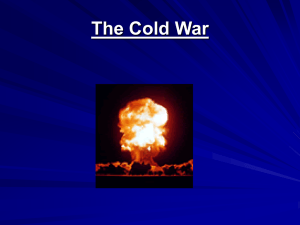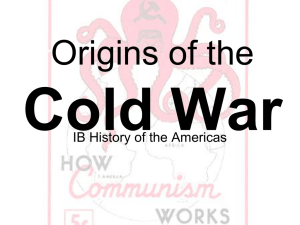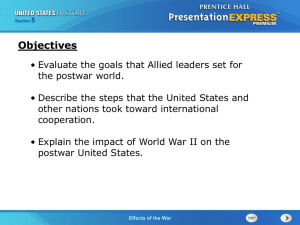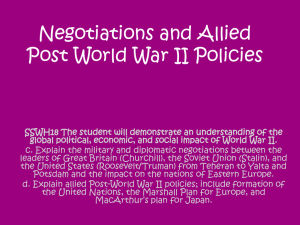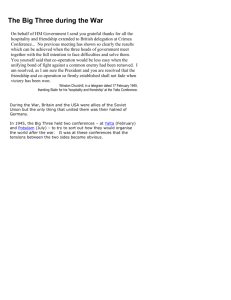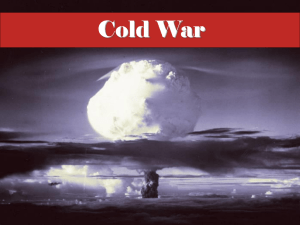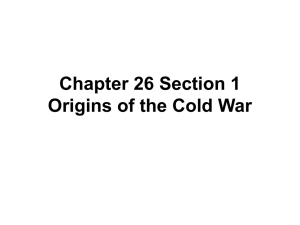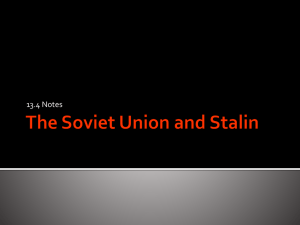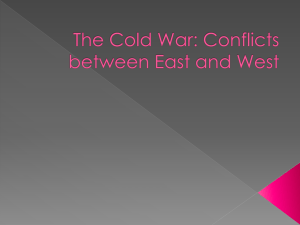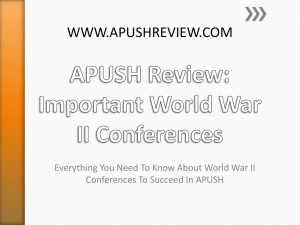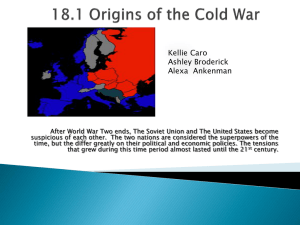The Potsdam Conference: July – August 1945
advertisement
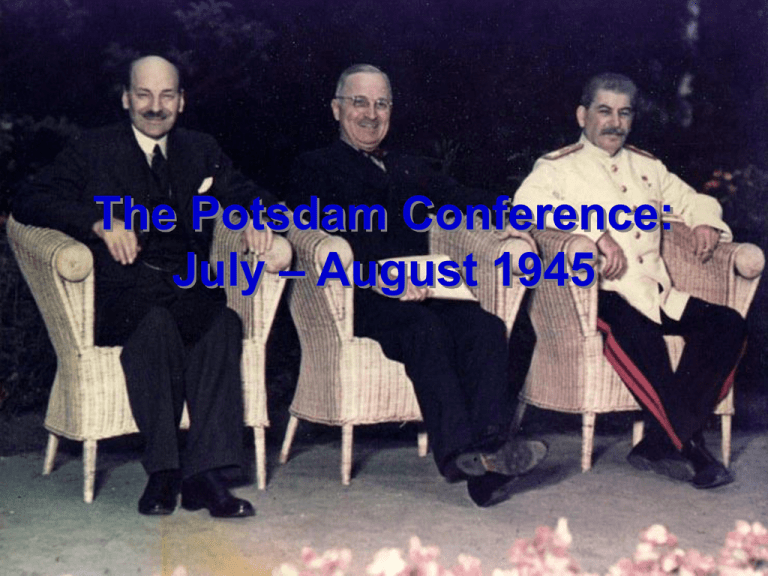
The Potsdam Conference: July – August 1945 Between Yalta & Potsdam • May 1945 – – – – Allied troops reached Berlin Hitler committed suicide Germany surrendered The war in Europe was over • July 1945 – Second conference arranged in Berlin suburb of Potsdam – In the five months after Yalta changes had occurred that greatly affected relationships between allied leaders The upper left-hand picture is to be used in a newspaper in April 1945. Write a caption to go with it. Changes • Stalin’s armies were occupying Eastern Europe – S did not withdraw from ‘liberated’ countries (Baltic States, Finland, Poland, Czechoslovakia, Hungary, Bulgaria and Romania) – Civilians fled, fearing Communist take-over – S set up Communist gov’t in Poland, against Poles’ wishes – USA, (E) protested but S said he needed buffer from possible future attacks • USA had a new president – 12 April 1945: FDR died. – Harry S Truman much more anti-communist – Truman & advisors saw Soviet actions in Eastern Europe as prep for take-over of all of Europe • USA had tested an atomic bomb – 16 July 1945: A-bomb tested. Truman told Stalin Explain how each of the three developments described above might affect relationships at Potsdam. Disagreements at Potsdam • Began July 17, 1945 – 1/2 way through Churchill defeated in election, replace by Clement Attlee – Truman & S could not appreciate each other’s point of view • The disagreements – Germany: S wanted to permanently cripple (G) while T did not want to repeat the mistakes of the Versailles Treaty – Reparations: 20-27 million Soviet citizens killed & Russia devastated. S demanded compensation while T resisted as per above – Soviet policy in Eastern Europe: @Yalta S got support to put in place pro-Soviet gov’ts in Eastern Europe. ‘If the Slav people are united, no one will dare move a finger against them.’ T very unhappy w/ S’s intentions, chose ‘get tough’ policy toward Soviet Union, Stalin ‘Iron Curtain’ • Potsdam ended w/o agreement on issues • 1946: S tightened control of Eastern Europe – Poland, Hungary, Romania, Bulgaria and Albania all had Communist gov’ts loyal to S – Churchill, speaking to the Westminster College (Fulton, Missouri) graduating class of 1946 that border between Soviet-controlled countries and the West was an ‘iron curtain’. The name stuck. A British cartoon commenting on Churchill’s ‘Iron Curtain’ speech, in the Daily Mail, 6 March 1946 Eastern Europe 1945 - 1948 The allies had given the USSR control of the eastern sector of (G). It was run by the USSR effectively under Red Army control until the creation of the German Democratic Republic in 1949. After the war the Communists joined a coalition gov’t, then became outright leaders in 1947 when they forced the noncommunist leader into exile. A left-wing coalition won elections in 1945. In 1946 Communists became the largest single party, but still in a coalition. In 1948, when their position was threatened, they banned other parties and made Czechoslovakia a Communist, one-party state. Both France and Italy had strong Communist parties which belonged to Cominform Communists became the largest single party in the 1947 elections. They imprisoned opposition politicians, and attacked Church leaders. In 1945 a Communist was elected Prime Minister within a left-wing coalition. In 1947 the Communists also abolished the monarchy. A left-wing coalition won elections in 1945. The Communist members of the coalition then executed the leaders of the other parties. Marshall Tito had led war-time resistance to the Nazis. He was elected President in 1945. However, he was determined to apply Communism in his own way and was expelled from Cominform in 1948 Communists gained power immediately after the war. There was little opposition (E) & the USA supported the royalist side in a civil war which defeated the Communist opposition Stalin Tightens control • Eastern Europe – Secret police imprisoned anyone opposing communist rule, or might oppose it • Oct 1947: Stalin set up Cominform – Communist Information Bureau to coordinate all communist parties in E Europe – E Europe leaders regularly brought to Moscow to be briefed, watched by Stalin – S replaced any independent thinkers – Tito of Yugoslavia remained free of S’s rule, thrown out of Cominform in 1948 – Tito would prove to be a painful thorn in USSR’s flesh Potsdam Conference • This war is not as in the past; whoever occupies a territory also imposes on it his own social system. Everyone imposes his own system as far as his army has power to do so. It cannot be otherwise. – Stalin speaking, soon after the end of the Second World War, about the takeover of Eastern Europe At Yalta, Churchill and Roosevelt had agreed with Stalin that eastern Europe would be a Soviet ‘sphere of influence’. Do you think Stalin’s idea is what they had in mind? Explain. • If we see that Germany is winning we should help Russia, and if Russia is winning we ought to help Germany, and that way let them kill as many as possible. – Senator Harry S Truman, quoted in the New York Times on June 24, 1941, two days after Nazi Germany attacked the Soviet Union • Poland has borders with the Soviet Union which is not the case with Great Britain or the USA. I do not know whether a truly representative government has been established in Greece. The Soviet Union was not consulted when this government was being formed, nor did it claim the right to interfere because it realizes how important Greece is to the security of Great Britain. – Stalin, replying to Allied leaders about his plans for Poland in April 1945. Britain had helped to prop up an anti-Communist government in Greece Would Churchill and Roosevelt agree with Stalin’s views expressed in the first and third PSDs? Explain Potsdam Conference • A shadow has fallen upon the scenes so lately lighted by the Allied victory. From Stettin on the Baltic to Trieste on the Adriatic, an iron curtain has descended. Behind that line lie all the states of central and eastern Europe. The Communist parties have been raised to power far beyond their numbers and are seeking everywhere to obtain totalitarian control. This is certainly not the liberated Europe we fought to build. Nor is it one which allows permanent peace. – Winston Churchill speaking in the USA, in the presence of President Truman, March 1946 • The following circumstances should not be forgotten. The Germans made their invasion of the USSR through Finland, Poland and Romania. The Germans were able to make their invasion through these countries because, at the time, governments hostile to the Soviet Union existed in these countries. What can there be surprising about the fact that the Soviet Union, anxious for its future safety, is trying to see to it that governments friendly in their attitude to the Soviet Union should exist in these countries? – Stalin, replying to Churchill’s speech How do the two PSDs above differ in their interpretation of Stalin’s actions? Explain why they see things so differently.
